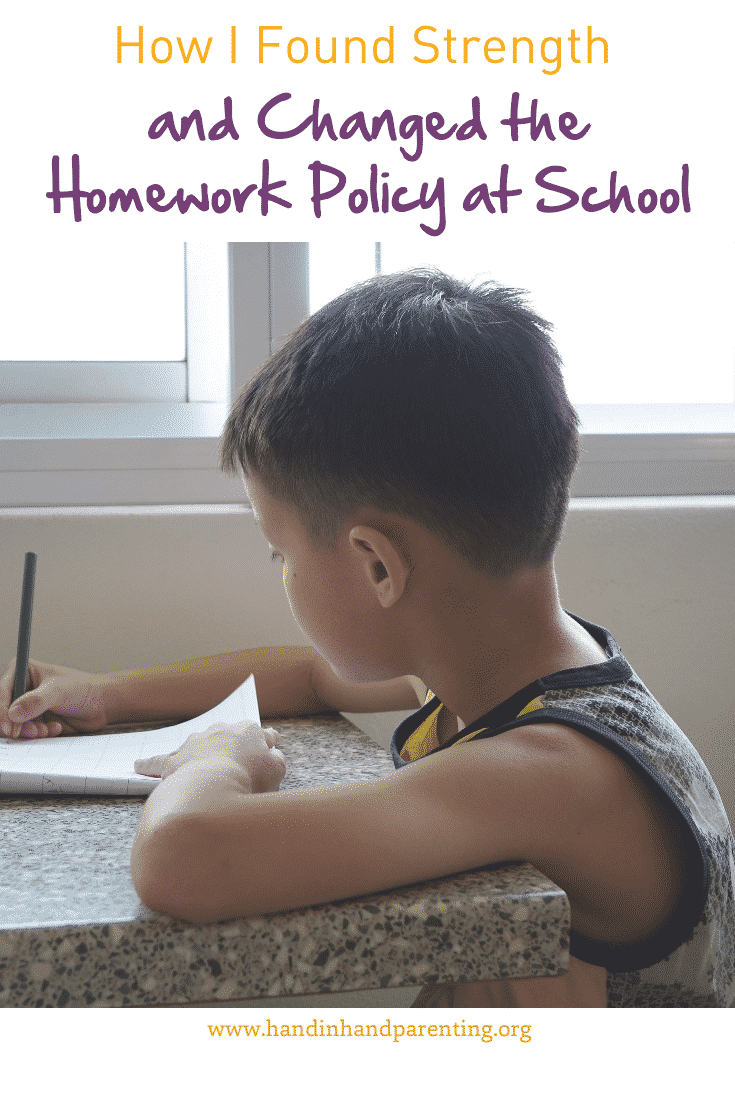 I used to be a high school teacher. As a teacher, I gave homework. That was my job and a tradition, something that I didn’t even think to question.
I used to be a high school teacher. As a teacher, I gave homework. That was my job and a tradition, something that I didn’t even think to question.
So when my older son entered Kindergarten, I also didn’t question the homework my son brought home on Monday, due Friday. They were simple tasks, but my son was exhausted after six hours of schooling. He would hold it together quietly until he got home. Then, he would be cranky and ready to offload his tensions.
To ask him to do another round of academic work felt almost cruel. He needed to play with friends and brother, relax and build his legos. He needed to eat, too, because he wasn’t a big eater at school.
Trying to Motivate My Child To Do Homework
I tried Special Time before homework, Playlistening around homework, and Staylistening about homework. It was a lot of work. And it worked when I was in a good shape, but other times, I couldn’t do it so well. My toddler would be asking for my attention, and cooking, cleaning, and all my other tasks needed my attention.
I thought this must be another thing that I needed to learn to be good at, so I kept trying and kept feeling like a failure. I really didn’t see how my son would be learning from these tasks.
I was getting a lot of Listening Time for myself daily for many reasons. For one, I felt overwhelmed with so much to do already and felt unable to do yet one more task that was more than my small family was barely keeping up with. When I did listening, I somehow regained my mental energy to tackle a new day with new energy, so I prioritized it in my day. Then I read books on homework, and I helped my son do homework by listening to his feelings.
One of the teachers gave me advice, telling me to “Organize your study area and have a homework routine.” When I could not follow this, I felt like a complete failure for not being able to do such a simple thing with my 6-year-old.
I often felt small and helpless
Is Homework Even Necessary?
When my son entered First Grade, he brought home different homework every day that due the next day. I recall that one day, after a field trip to a zoo, he was assigned to write about it to hand in the next day.
As a pre-reader, he couldn’t even read yet. He was exhausted, and writing was his least favorite task! We spent half an hour on it and he wasn’t done, so I sent the homework to school anyway, with a note, “My son spent half an hour and I asked him to turn it in even though it is not finished.”
Me Bring Change? “No Way!”
I asked about homework in one of Hand in Hand's support calls. Patty Wipfler told me that there was a book on the subject called “The Case Against Homework.” She said I could “organize parents to change the homework practice at school.”
“What!? Me, organizing parents to change!? No way!” That was my first reaction. As a first generation immigrant and a renter, both of which were rare in the community, I felt marginalized in an affluent and achievement-oriented public school.
So, once again, I took my feelings to Listening Time, where I realized I was embarrassed and guilty that I had imposed homework as a teacher in the past while being completely ignorant and untrained about homework practice. I also felt I could not share these new understandings with others since I thought no one would agree with me.
And I wondered, what about teaching him my language? What about play and enjoying nature? None of this was in the school curriculum, but they seemed to be important in my son’s development, yet I felt I did not know enough to back up my beliefs.
All the while I was having these questions and doubts as a result of my late-night-after-kids-bedtime research on homework efficacy, I still needed to help my son do his homework, which was required by the school.
Finding My Strength
Listening Partnership became a way that I could clean my emotional plate and air my doubts safely, so they would not sabotage and undermine my support of him during his homework.
Reading the book Patty suggested, I learned that there was a very little academic and non-academic gain for elementary school students to do homework. It was eye-opening, but I felt very alone as I looked around and found no one interested in talking about the ideas. Still, I approached a school counselor, a teacher and a couple of parents in the next year, but no one really understood what I was concerned about. They would say, “I think homework is important for building good work habits, practicing and mastering skills. Period.”
I kept talking, often feeling awkward and inadequate. I felt lonely in my struggle for a long time, and my tendency was to doubt myself in those situations. My Listening Partners gave me the optimism and unshakable confidence I needed to trust myself and my thinking.
I would not have done this work without my Listening Partners.

Finding My Voice
I kept working with my son on homework, but I talked with the classroom teacher as soon as he entered Second Grade, saying that I wanted him to stop when I felt he had worked long enough. And that’s what I did. I wrote notes like, “My son worked on this homework for 20 minutes and I asked him to stop,” or “My son didn’t do his homework as his cousin was visiting.”
By the end of Second Grade, another parent finally approached me and invited me to a meeting. Now there were seven other mothers who were not happy about the academic pressure at school, especially the amount of homework, even though some of them had children that had no trouble completing it.
Out of the seven, four of us met with the superintendent and the Principal just before our children entered Third Grade. We appreciated the Administrators, listened to them, and told, for a couple of minutes each, our stories about how we wished for our children to be able to enjoy their after school time rather than experience the stress and pressure they felt from the busy work they needed to do at home.
It was so moving to finally hear other parents openly talk about how things were in their homes.
The next day, the school had a teacher meeting on homework. They stopped busy work, reduced time required for homework, and focused more on reading at home. Kindergarten homework became optional. Even though the homework policy didn’t change, the practice changed. Our school kept on holding meetings about homework and invited parents to speak, too. We four mothers kept meeting with the administrators and became known as the “Homework Moms.”
 Finally Making A Change
Finally Making A Change
We each collected stories from neighboring schools when they revised their homework policies or implemented “no homework month” and sent them to administrators by email.
That year, my younger son entered Kindergarten and he didn’t have homework for two years. I was able to see he wanted to keep learning without the pressure of having to do what someone else told him to do. He kept reciting numbers and spelling happily and voluntarily at home.
It was a stark contrast to what my older son had been through. While my older son resisted more work at home, my younger son spontaneously did it. His learning came from within rather than by force.
A Different Homework Story Today
Now my sons are in Fifth and Second Grades. They bring back some homework, and these days, it is not very hard for them to do. If they work enough and can’t finish, I am ready to write a note to the teacher but so far I haven’t done so year. When they feel stuck and can’t start homework, my sons often ask for a pillow fight, which, four years ago, felt like a practice learned from a Martian, and so very different from my Asian upbringing of “suck it up and do it.”
Now I know that the laughter and full body play relaxes my sons and enables them to focus on homework.
Over the last three years, I've heard parents comment, often unsolicited and not knowing that I was one of the “Homework Moms,” about how afterschool time has become more relaxed due to the decreased amount of homework.
I wouldn't have read that book or talked about it with others if it wasn't for the love of my sons.
My Listening Partnerships were crucial in gaining the strength and clarity I needed to deal with the homework issue. Not only did my Listening Partners help me shed my feelings and keep motivated as I took every step, but I also used the same Listening Time structure and guidelines in meetings, where I found that the listening and appreciation I gave often opened people’s ears.
More Resources About Homework
- The Homework Myth: Why Our Kids Get Too Much of a Bad Thing by Alfie Kohn
- The Case Against Homework: How Homework Is Hurting Children and What Parents Can Do About It By Sara Bennett
- http://stophomework.com is Sara Bennett's site
- http://challengesuccess.org (type in “homework” in search section)
Listening Partnerships Online Class
Hand in Hand's Building a Listening Partnership course is part of the Positive Parenting eBundle sale. You get 20 videos presented by Patty Wipfler and you'll learn simple techniques to offload tension caused by grief, anger, guilt, frustration and exhaustion. Click to find out more.